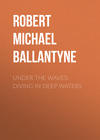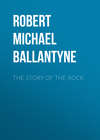Kitabı oku: «The Madman and the Pirate», sayfa 5
“But the swamps are not yours,” objected the other.
“No matter—they are not yours. They are neutral ground, and must not be touched.”
“Well, we will not touch them,” said the peaceful Raturan.
This reply disconcerted the fiery mountaineer, for he was anxious to fight.
“But that is not enough,” he resumed, as a bright idea struck him, “you must promise not even to look at our mountain.”
The man of Ratura reflecting how ill able his tribe was to go to war just then, agreed not even to look at the mountain!
“More than that” resumed the mountaineer, “you must not even wink at it.”
“We will not even wink at it,” replied his foe. “Still further,” continued the warlike mountaineer in sheer desperation, “you must not even think of it.”
“We will not think of it” answered the accommodating man of Ratura.
“Bah! you may go—you peace-loving cowards,” said the disappointed mountaineer, turning on his heel in bitter disappointment.
“Yes, you may go—in peace!” said Ongoloo with sententious gravity, waving his band grandly to the retiring men of Ratura, and walking off with an air of profound solemnity, though he could not help laughing—in his arm, somewhere, as he had not a sleeve to do it in.
But the Raturans did not go in peace. They went away with bitter animosity in their hearts, and some of them resolved to have a brush with their old foes, come what might.
Savages do not, as a rule, go through the formality of declaring war by withdrawing ambassadors. They are much more prone to begin war with that deceptive act styled “a surprise.”
Smarting under the taunts of their foes, the Raturans resolved to make an attack on the enemy’s village that very night, but Ongoloo was more than a match for them. Suspecting their intentions, he stalked them when the shades of evening fell, heard all their plans while concealed among the long grass, and then, hastening home, collected his warriors.
It chanced that Zeppa had returned from one of his rambles at the time and was lying in his hut.
“Will you come out with us and fight?” demanded Ongoloo, entering abruptly.
The mention of fighting seemed to stir some chord which jarred in Zeppa’s mind, for he shook his head and frowned. It is possible that, if the savage had explained how matters stood, the poor madman might have consented, but the chief had not the time, perhaps not the will, for that. Turning quickly round, therefore, he went off as abruptly as he had entered.
Zeppa cared nothing for that. Indeed he soon forgot the circumstance, and, feeling tired, lay down to sleep.
Meanwhile Ongoloo marched away with a body of picked men to station himself in a narrow pass through which he knew that the invading foe would have to enter. He was hugely disgusted to be thus compelled to fight, after he had congratulated himself on having brought the recent palaver to so peaceful an issue. He resolved, however, only to give his enemies a serious fright, for he knew full well that if blood should flow, the old war-spirit would return, and the ancient suspicion and hatred be revived and intensified. Arranging his plans therefore, with this end in view, he resolved to take that peaceful, though thieving, humorist Wapoota, into his secret councils.
Summoning him, after the ambush had been properly arranged and the men placed, he said,—“Come here, you villain.”
Wapoota knew that Ongoloo was not displeased with him by the nature of his address. He therefore followed, without anxiety, to a retired spot among the bush-covered rocks.
“You can screech, Wapoota?”
“Yes, chief,” answered the ex-thief in some surprise, “I can screech like a parrot the size of a whale.”
“That will do. And you love peace, like me, Wapoota, and hate bloodshed, though you love thieving.”
“True, chief,” returned the other, modestly.
“Well then, listen—and if you tell any one what I say to you, I will squeeze the eyes out of your head, punch the teeth from your jaws, and extract the oil from your backbone.”
Wapoota thought that this was pretty strong for a man who had just declared his hatred of bloodshed, but he said nothing.
“You know the rock, something in shape like your own nose, at the foot of this pass?” said Ongoloo.
“I know it, chief.”
“Well, go there; hide yourself, and get ready for a screech. When you see the Ratura dogs come in sight, give it out—once—only once,—and if you don’t screech well, I’ll teach you how to do it better afterwards. Wait then till you hear and see me and my men come rushing down the track, and then screech a second time. Only once, mind! but let it be long and strong. You understand? Now—away!”
Like a bolt from a crossbow Wapoota sped. He had not been in hiding two minutes when the Ratura party came stealthily towards the rock before mentioned. Wapoota gathered himself up for a supreme effort. The head of the enemy’s column appeared in view—then there burst, as if from the bosom of silent night, a yell such as no earthly parrot ever uttered or whale conceived. The very blood in the veins of all stood still. Their limbs refused to move. Away over the rolling plain went the horrid sound till it gained the mountain where, after being buffeted from cliff to crag, it finally died out far up among the rocky heights.
“A device of the Ratura dogs to frighten us,” growled Ongoloo to those nearest him. “Come, follow me, and remember, not a sound till I shout.”
The whole party sprang up and followed their chief at full gallop down the pass. The still petrified Raturans heard the sound of rushing feet. When Wapoota saw the dark forms of his comrades appear, he filled his chest and opened his mouth, and the awful skirl arose once again, as if to pollute the night-air. Then Ongoloo roared. With mingled surprise and ferocity his men took up the strain, as they rushed towards the now dimly visible foe.
Savage nerves could stand no more. The Raturans turned and fled as one man. They descended the pass as they had never before descended it; they coursed over the plains like grey-hounds; they passed through their own villages like a whirlwind; drew most of the inhabitants after them like the living tail of a mad comet, and only stopped when they fell exhausted on the damp ground in the remotest depths of their own dismal swamps.
Chapter Seven
Strange to say, the anger of the Raturans was not assuaged by the rebuff which they received at that time. They took counsel again, and resolved to wait till the suspicions of the Mountain-men had been allayed, and then attack them when off their guard.
Meanwhile Zeppa, who did not at all concern himself with these matters, took it into his head one day that he would teach his little favourite, Lippy, to sing. Being a religious man he naturally selected hymns as the foundation of his teaching. At first he found it rather up-hill work, for Lippy happened to be gifted with a strong sense of the ludicrous, so that when he took her on his knee—the day on which the idea occurred to him—opened his mouth, and gave forth the first notes of a hymn in a fine sonorous bass voice, the child gazed at him for a few moments in open-eyed wonder, and then burst into an uncontrollable fit of open-mouthed laughter.
Poor Zeppa! till that day, since his mental break-down, the idea of singing had never once occurred to him, and this reception of his first attempt to teach disconcerted him. He stopped abruptly and gazed at the child with a perplexed expression. This gaze was evidently regarded by Lippy as an additional touch of humour, for she went off into renewed explosions of delight and the lesson had to be given up for that time. Zeppa was gifted, however, with patient perseverance in a remarkable degree. He renewed his efforts, but changed his plan. From that time forward he took to humming hymns in a low, sweet voice, as if for his own amusement. In a short time he had the satisfaction of hearing Lippy attempt, of her own accord, to sing one of the hymns that had taken her fancy. She went wrong in one or two notes, however, which gave Zeppa the opportunity of putting her right. He took her on his knee, and told her, in her own tongue, to try it again.
“Listen, this is the way,” he said, opening his mouth to give an example; but the first note had scarcely begun to sound when Lippy thrust her brown fist into his mouth, and told him to stop. She would sing it herself!
Accordingly, she began in a sweet, tiny little voice, and her teacher gazed at her with intense pleasure depicted on his handsome face until she reached the note where she had formerly gone wrong.
“No—not so; sing thus,” he said, giving the right notes.
The pupil took it up at once, and thus the singing lessons were fairly begun.
But the matter did not rest here, for Lippy, proud of her new acquirement soon began to exhibit her powers to her little companions, and ere long a few of the smallest of these ventured to creep into Zeppa’s hut while the daily lesson was going on. Gradually they grew bolder, and joined in the exercise. Zeppa took pleasure in helping them, and at last permitted as many as could crowd into his hut to do so. Those who could not get inside sat on the ground outside, and, as the hut was open in front, the gathering soon increased. Thus, insensibly, without a well-defined intention or effort on the part of any one, the praise of God and the sweet name of Jesus ascended to heaven from that heathen village.
The assembling of these children for their lesson brought powerfully to Zeppa’s mind, one day, the meetings of the Ratinga people for worship, and the appropriateness of beginning with prayer occurred to him. Accordingly, that morning, just as he was about to commence the hymns, he clasped his hands, raised his eyes, and briefly asked God’s blessing on the work.
Profound astonishment kept the little ones quiet, and before they had time to recover the prayer was over.
Zeppa’s mode of terminating the assembly was characteristic. He did not like to order the children away, much less to put them out of his hut, and the little creatures, being fond of the teacher, were prone to remain too long. When, therefore, he thought it time to close, he simply rose up and took himself off, leaving his congregation to disperse when and how it pleased! Sometimes on these occasions he would remain away for, perhaps, two or three days, having totally forgotten the singing class, to the great disappointment of the children.
One night, while he was thus absent, the men of Ratura delivered the attack which they had long meditated.
It was an unusually dark and still night; such a night as tends almost irresistibly to quiet and subdue wayward spirits, and induces man to think of his Creator. Such a night as is apt to fill the guilty conscience with unresting fears, as though it felt the near approach of that avenging sword which sooner or later it must meet.
Nevertheless, unmoved by its influences—except in so far as it suited their dark designs—the Raturans chose it for the fell purpose of invading their neighbours’ lands, and exterminating their ancient foes; for, driven to desperation by the taunts and scorn of the Mountain-men, they felt that nothing short of extermination would suffice. And they were right. Extermination of the sinners, or the sins, was indeed their only chance of peace! Not knowing the Gospel method of blotting out the latter, their one resource lay in obliterating the former.
In the dead of night—that darkest hour when deeds of villainy and violence are usually done—the Raturan chief once more assembled his men from all quarters of the rolling plains and the dismal swamps, until the entire force of the tribe was under his command.
Leaving the aged men and boys to protect the women and children, those dark-skinned warriors marched away to battle—not with the flaunting banners and martial music of civilised man, but with the profound silence and the stealthy tread of the savage. Though the work in hand was the same, the means to the end were different; we will therefore describe them.
Had it been a daylight battle to which they went forth, their women and boys would have followed with reserve ammunition in the shape of baskets full of stones, and spare javelins; but, being a night attack, the fighting men went alone—each armed with a heavy club, a light spear, and a stone knife or hatchet.
Arrived at the pass where they had met with such a singular repulse on a former occasion, the main body was halted, and scouts were sent out in advance to see that all was clear. Then the plan of attack was formed. One detachment was to approach the enemy’s village on the right; another was to go round to the left; while the main body was to advance in front.
There is a proverb relating to the plans of men as well as mice, which receives verification in every land and time. Its truth received corroboration at this time on Sugar-loaf Island. On that same night it chanced that the chief Ongoloo was unable to sleep. He sent for his prime-ministerial-jester and one of his chiefs, to whom he proposed a ramble. The chief and jester professed themselves charmed with the proposal, although each had been roused from a pleasant slumber.
In the course of the ramble they came unexpectedly on one of the Raturan scouts, whom they temporarily extinguished with a club. Ongoloo became at once alive to the situation, and took instant action.
“Wapoota!” he said in an excited whisper, “run to the rear of the foe. Go swiftly, like the sea bird. When you get there, yell, shriek—like—like—you know how! As you did last time! Change your ground at each yell—so they will think you a host. Fear not to be captured. Your death is nothing. Away!”
A kick facilitated Wapoota’s flight, and the two chiefs returned at speed to rouse the sleeping camp.
Wapoota performed his part nobly—and without being captured, for he did not agree with Ongoloo as to the unimportance of his own death! At the unexpected outcry in the rear the Raturans halted, and held a hasty council of war.
“Let us go back and fight them,” said one.
“No use, they are evil spirits—not men,” said another.
Some agreed with the former—some with the latter.
“While we waste time here,” said the leading chief, “the mountain dogs will get ready for us. Come! Forward!”
The chief was right. Ongoloo’s ruse caused delay, so that when the Raturans reached the village they found armed men ready to receive them. These they attacked with great courage, and waged a somewhat scrambling fight until daylight enabled each party to concentrate its forces.
Meanwhile, at the first alarm, the women and children of the village had been sent off to the mountains for safety. Among the fugitives were Lippy and her mother. These happened to meet with the enemy’s detachment which had been sent to assault the village on the left. The women scattered and fled. The savage warriors pursued, and several were taken, among them Lippy and her mother, who were promptly despatched to the rear. Those of the broken band that escaped continued their flight to the hills.
They had not gone far when they met Zeppa returning from one of his rambles. His surprise on hearing that the village had been attacked was great and his anxiety considerable. Although he had refused to go out to war with his entertainers, he felt no disposition to stand idly by when they were attacked. Disordered though his mind was, he could make a clear distinction between aggressive war and self-defence.
“And where is Lippy?” he asked, glancing round on the terrified faces.
“She is caught and carried away—with her mother.”
“What!” exclaimed Zeppa, with a flash of his bright eyes that told of natural rage mingling with the fires of insanity.
The women did not wait for more. They ran away from him in terror.
But Zeppa had heard enough. Turning his face towards the village he sped over the ground at a pace that soon brought him in sight of the combatants, who seemed to be swaying to and fro—now here, now there—as the tide of battle flowed and victory leaned sometimes to one side sometimes to the other.
Zeppa was unarmed. As he drew near he was observed by both parties to stop abruptly in his career, and wrench out of the ground a stake that had been meant for the corner-post of a newly-begun hut. It resembled the great club of Hercules rather than a weapon of modern man.
Whirling it like a feather round his head, the maniac rushed on. He was thoroughly roused. A feeling of desperate anxiety coupled with a sense of horrible injustice had set his spirit in a blaze. His great size, which became more apparent as he advanced, his flashing eyes, compressed lips, and the wild flowing of his uncut hair and beard, gave him altogether an aspect so terrible that his foes trembled, while his friends rejoiced, and when at last he uttered a roar like a mad bull, and launched himself into the thickest of the fight the Raturans could not stand it, but turned and fled in a body under the impression that he was more than human. He was too fleet for them, however. Overtaking a flying knot, he brought the the corner-post down on the mass, and three warriors were levelled with the ground. Then, hurling the mighty club away as if it were a mere hindrance to him, he ran straight at the leader of the Raturans, who, being head and shoulders above his fellows, seemed a suitable foe to single out.
Before reaching him, however, his attention was arrested by a cry from some one in the midst of the enemy in front. It was the voice of Wapoota, who was trying to break his way through the flying foe to his own people.
Fortunately Zeppa recognised the voice, and darted towards his friend, who was hard pressed at the time by a crowd of opponents.
One roar from the maniac sent these flying like chaff before the wind. It must be added, however, for the credit of the men of Ratura, that Ongoloo and his warriors had backed up their new leader gallantly.
When Wapoota saw his deliverer, he ran to him, panting, and said—
“Come with me—this way—Lippy is here!”
That was sufficient. Zeppa became submissive like a child, while the jester, taking him by the hand, ran with him at racing speed in the direction of the Raturan villages, towards which the child and her mother were being led by the party which had captured them.
This was briefly explained to Zeppa by Wapoota, who had chanced to encounter the party when returning from his yelling mission, if we may so express it.
The race was a long one, but neither the madman nor his friend flagged until they overtook the party. It consisted of about thirty warriors, but if it had been thirty hundred it would have made no difference in the effect of Zeppa’s roar and aspect as he rushed upon them with obviously awful intentions, though without arms. In fact the latter circumstance tended rather to increase the fears of the superstitious natives. They fled as one man at the first sight of the maniac and Lippy was recovered!
Instantly Zeppa’s ferocity vanished, and the tenderest of smiles rippled over his face as he took the child in his arms and kissed her.
But Wapoota did not feel quite so easy, for in their mad race they had outstripped the flying enemy, bands of whom were constantly passing them in their flight before the Mountain-men. His anxieties, however, were groundless, for no sooner did any of the Raturans set eyes on Zeppa, than, with howls of consternation, they diverged at a tangent like hunted hares, and coursed away homeward on the wings of terror.
As on former occasions of conquest, the Mountain-men pursued the flying host into their swamps, but they did not, as in former times, return to slay the aged and carry the women and children into captivity.
To the surprise of all his followers, and the anger of not a few, Ongoloo commanded his men to return to their village and leave the Raturans alone. One of his chiefs, who showed a disposition to resist his authority, he promptly knocked down, whereupon the rest became obedient and went quietly home.
On reaching the village, Zeppa went straight to his hut with Lippy on his shoulder. Apparently he had forgotten all about the recent fight for, without even waiting to take food or rest he sat down, and began to give his little friend a singing lesson!
With the air of a little princess, who felt that she was only receiving her due, the child accepted the attention. Her young companions, attracted by the sweet sounds, soon flocked to the old place of rendezvous, and when the last of the straggling warriors returned from the field of battle they found the singing class going full swing as if nothing had happened.
But when the wounded and the dead were brought in, other sounds began to arise—sounds of wailing and woe, which soon drowned the hymns of praise. As soon as Zeppa became fully alive to this fact he ceased singing and went about trying to comfort those who wept but, from his perplexed air, and the frequency with which he paused in his wanderings to and fro and passed his hand across his brow, as if to clear away some misty clouds that rested there, it was evident that his shattered intellect had taken in a very imperfect impression of what had occurred.
As if to get rid of this beclouded state, he started off that evening at a quick walk towards his favourite haunts among the hills. No one ever followed him on these occasions. The natives regarded his person as in some measure sacred, and would have deemed it not only dangerous but insolent to go up among the rocky heights when the madman was known to be there.
Once, indeed, Wapoota, with that presumptuous temerity which is a characteristic of fools in general, ventured, on the strength of old acquaintance, to follow him, and even went towards the well known cave where he had found refuge and protection in the day of his distress; but Zeppa had either forgotten his former intercourse with the jester or intended to repudiate the connection, for he did not receive him kindly.
On the way up, Wapoota, who felt somewhat timorous about the visit, had made up his mind as to the best mode of address with which to approach his friend. He had decided that, although he was not particularly youthful, the language and manner of a respectful son to a revered father would best befit the occasion. Accordingly when he reached the cave and saw Zeppa busy beside his fire with a cocoa-nut, he assumed a stooping attitude of profound respect, and drew near.
Zeppa looked up with a frown, as if annoyed at the intrusion.
“Your unworthy son,” began Wapoota, “comes to—”
But he got no further. He could not well have hit upon a more unfortunate phrase.
“My unworthy son!” shouted Zeppa, leaping up, while unearthly fires seemed to shoot from his distended eyes. “My son! son! Ha! ha-a-a-a!”
The horrified intruder heard the terminal yell, and saw the maniac bound over the fire towards him, but he saw and heard no more, for his limbs became suddenly endued with something like electric vitality. He turned and shot over a small precipice, as if flung from an ancient catapult. What he alighted on he did not know, still less did he care. It was sufficiently soft to prevent death.
Another awful cry echoed and re-echoed from the heights above, and intensified the electric battery within him. He went down the slopes regardless of gradient at a pace that might have left even Zeppa behind if he had followed; but Zeppa did not follow.
When Wapoota went over the precipice and disappeared, Zeppa halted and stood erect, gazing with a questioning aspect at the sky, and drawing his hand slowly across his brows with that wearied and puzzled aspect which had become characteristic.
Returning after a few minutes to his cave, he reseated himself quietly beside his fire, and, with his usual placid expression, devoted himself earnestly to his cocoa-nut.
That was the first and last occasion on which the poor madman experienced intrusion from the natives in his mountain retreat.










